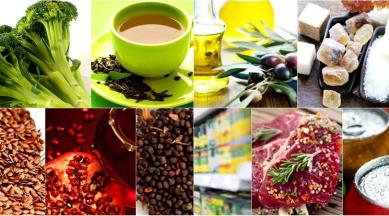📣 For more lifestyle news, click here to join our WhatsApp Channel and also follow us on Instagram
World Cancer Day: What to eat and what to avoid to keep the disease at bay
Don't you wish there was a diet to keep a check on cancer?

One of the highest growing diseases in the world, cancer blocks channels, stops body systems to function and ultimately leads to death in most of the cases. Interestingly, several lifestyle factors contribute to the cancer risk. From smoking to obesity and sleeping cycles, controlling our lifestyle can help us to stay away from the deadly disease.
Different types of cancer affect men and women. Top five most diagnosed cancers for men are: lung, prostate, colorectal, stomach, and liver; and the top five most diagnosed cancers for women are: breast, colorectal, lung, cervix, and stomach. Not only does our diet affect the risk of development and survival of cancer but other non-communicable lifestyle disorders such as diabetes, hypertension and heart diseases too.
Experts say that following the right diet can cut the risk of the disease by as much as 50 per cent. Therefore, it is necessary to eat healthy and sleep well. Don’t you wish there was a diet to keep a check on cancer? Well, if not a diet plan, it is essential to keep a check on what to eat and what not to.
See what else is making news in lifestyle, here
Some foods can help you stay fit and reduce the effect of carcinogens. A healthy balanced diet with plenty of fibre, fruit and vegetables can help cut cancer risk. Much has been said about foods that can shield you against cancer, but it is surprising that the knowledge of dietary components that can worsen the risk of developing cancer is equally significant. With inputs from Dr Vinay Bhardwaj from Grow Fit, keep note of the food items that should be avoided.
Take a look at the cancer-fighting foods and the cancer-promoting foods:
WHAT TO EAT
Broccoli: Broccoli is one of the biggest cancer fighters for prostate, colon and bladder cancer. It is the one and only a sizable amount of sulforaphane, a particularly potent compound that boosts the body’s protective enzymes and flushes out cancer-causing chemicals. It contains fibre, which has its own benefits and helps you to meet your daily fibre needs.
Flax: Also known as linseed, it can be eaten as whole seeds and reduces the risk of breast cancer. In addition, it lowers the cholesterol level, help in many digestive conditions such as chronic constipation, diarrhoea, diverticulitis, irritable bowel syndrome (IBS), ulcerative colitis, gastritis, and enteritis.
Green Tea: According to studies, green tea is full of antioxidants and goes through much processing while leaving all the important cancer-fighting minerals intact. It keeps you safe from esophageal cancer, lung cancer, oral cancer, liver cancer, pancreatic cancer or prostate cancer. However, green tea interferes with the chemotherapy drug bortezomib (Velcade) and hence, should be avoided if under medication.
Lentils: Lentils work on cancers such as bowel and breast cancers. They also help the body to produce enzymes that have anti-cancer benefits. In addition, they are good at regulating blood sugar levels.
Pomegranate juice: Those with breast cancer in their family history should really take note. Pomegranate juice works very well for all types of cancer cells, slowing their growth and helping to stop the rapid spread that claims so many lives.
WHAT NOT TO EAT
Transfats: Transfats are obtained post extensive chemical treatment of vegetable oils. They are known as a potent trigger for cancer, heart disease and autoimmune disorders. The unhealthy levels of omega-6 fatty acids found in hydrogenated oils like dalda make it highly carcinogenic owing to their unique ability to attack and damage cell membranes.
Soda and carbonated beverages: These beverages are inundated with a host of chemicals, high fructose corn syrup and unhealthy sugar levels and provide absolutely zero nutritional value. Moreover, their caloric content is extremely high which can lead to fatal spikes in insulin levels, a home ground for cancer cells, if consumed on a regular basis.
Refined sugar: It is being increasingly solidified in the medical community that refined sugar is one of the most potent dietary risk factor for cancer and several other non-communicable disorders. Refined sugar is chemically processed and can significantly alter blood glucose levels, which is correlated with an increased cancer risk. Artificial sweeteners like aspartame are equally harmful.
Canned products: Food cans are lined with bisphenol-A, phthalates and styrene that are recognised as potent endocrine disrupters, meaning, they can disrupt the hormonal balance in the body. A carefully regulated hormonal environment is crucial to ward off any malignant formation in the body and these chemicals interfere with this critical balance.
Charred or smoked food products: Charred meats and other food products are prepared through a grilling process that increases the concentration of compounds called heterocyclic aromatic amines, which are known to be potent carcinogens.
📣 For more lifestyle news, click here to join our WhatsApp Channel and also follow us on Instagram